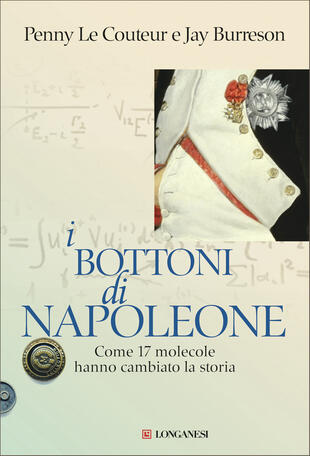

I bottoni di Napoleone
Tutti i formati dell'opera
Acquistalo
Sinossi
«Svolte epocali, dalle origini ai giorni nostri, appaiono indissolubilmente legate a precise formule chimiche.»
il Venerdì di Repubblica
«La storia di queste 17 molecole che hanno rivoluzionato la vita è più appassionante di un giallo.»
Quark
Che cosa ha dato e dà alla chimica la straordinaria facoltà di far nascere le civiltà e far cadere gli imperi? Il fatto che strutture chimiche, semplici e complesse, possano determinare con differenze minime l’intera varietà delle sostanze naturali. Quelle che hanno inciso sul corso della storia sono state moltissime: il pepe e le altre spezie (determinanti nelle scoperte geografiche e nella conservazione dei cibi fino all’avvento della refrigerazione), la seta (originaria della Cina, che diede un contributo allo sviluppo delle basi finanziarie del Rinascimento italiano), lo zucchero (che come il cotone alimentò la tratta degli schiavi e l’espansione economica che condusse alla Rivoluzione industriale), lo sviluppo delle armi da fuoco (che trasformò le tecniche della guerra), la gomma (che rivoluzionò il trasporto su strada) hanno esercitato la loro incredibile azione sul divenire della storia grazie a proprietà legate a piccoli gruppi di atomi presenti nelle loro molecole. E i bottoni di Napoleone (o meglio, dei suoi soldati) che c’entrano in tutto ciò? Perché l’esercito dell’imperatore fallì nella campagna di Russia del 1812? Secondo una teoria, perché i bottoni di stagno delle uniformi francesi si disintegrarono al gelo dell’inverno russo, impedendo agli uomini di combattere. Infine, lasciamo la parola a Roald Hoffmann, Premio Nobel per la chimica nel 1981: «Qualche atomo aggiunto qui, qualcuno sottratto là: ecco tutto ciò che fa la differenza tra le caratteristiche sessuali maschili e femminili, fra una molecola innocua e una letale. In che modo tutto questo funzioni, e come in realtà la cultura sia stata plasmata dalla chimica, è l’argomento di questo libro di grandissima leggibilità».
- ISBN: 883044622X
- Casa Editrice: Longanesi
- Pagine: 408
- Data di uscita: 30-03-2016
